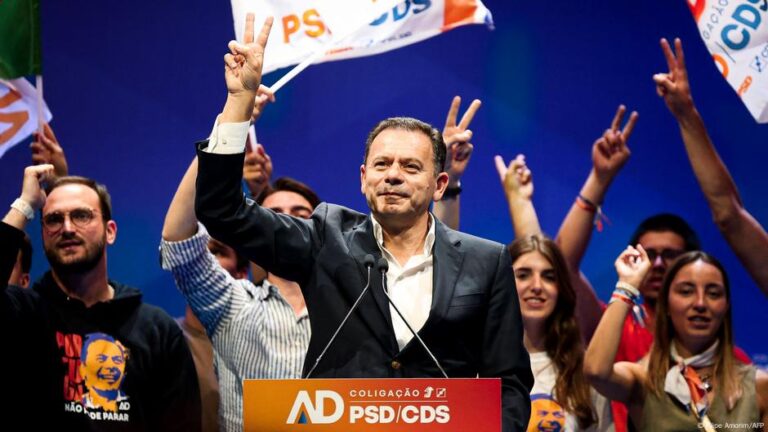Portugallooks set to stay under the minority government of the center-right Democratic Alliance (AD) grouping after elections on Sunday saw the left lose ground to the far-right, ultranationalist Chega party, which emerged as the country’s joint second political force with the Socialists.
In the third election in as many years, the AD, which is a permanent coalition of three parties including incumbent Prime Minister Luis Montenegro’s PSD, clinched just under a third of votes cast. The grouping won 89 of the 230 seats in the National Assembly.
Snapping at their heels with 58 seats came the ascendant Chega, which first appeared on Portugal’s political landscape in 2019.
Chega placed neck and neck with the Socialists — disrupting decades of stable bipartisan domination. Since the end of the right-wing dictatorship of Antonio Salazar in 1974, the government has virtually always passed back and forth between AD bloc parties and the center-left. The Socialists saw their seat count decline from 120 in 2022 to 58.
The result echoes the outcome of recent polls in Germany and is part of a general rightward drift across much of Europe.
Instability ahead
The exact path ahead for Portugal is unclear, though the center right looks poised to hold on to power. Montenegro has frequently ruled out teaming up the AD with Chega. Meanwhile, the Socialists leader Pedro Nuno promptly resigned, opening up the field for a new leadership.
For Portuguese journalist Paulo Pena, a minority AD government seems the most likely outcome for now, though there will also be calls for the center-left and center-right to work together, either formally or informally. “The pressure for that big coalition is huge,” Pena told DW by phone from the Portuguese capital Lisbon.
“I think the future leadership of the Social Democrats will at least be willing to negotiate some form of stability for the right-wing government, because nobody wants to go to elections again in the near future.”
Portuguese EU lawmaker Lidia Pereia, a member of the AD bloc, told DW that the “results grant the centre-right coalition a reinforced legitimacy to lead the next political cycle.”
Pereia sounded a warning: “The rise of the radical right, also in Portugal, must be approached with seriousness and responsibility by all democratic forces. This phenomenon is not isolated,” she said in a written statement.
Immigration, housing, corruption allegations
Montenegro appears to have emerged relatively unscathed by a conflict-of-interest scandal that toppled his government this March, triggering fresh polls a little a year after they came to power.
Earlier this year, questions were raised in the press about Spinumviva, a consultancy firm he founded in 2021 before he took office, later transferring ownership to his family, according to news agency Reuters.
Montenegro vehemently denied allegations Spinumviva’s clients had links to the government that presented conflict of interest concerns, but they were enough to bring about a vote of confidence that he lost.
In recent years, a series of high-profile political scandals have touched both major parties and generally taken their toll on the Portuguese public’s perception of politicians.
While the topics of immigration and housing were high on the agenda during the campaign across the board, corruption was one of Chega’s major talking points, which seems to have paid off.
The next few days will see exploratory talks between the major parties, bringing more clarity. Things could move quickly, though: after the last election, in March 2024, Montenegro formed a minority government within weeks.
Edited by: Saim Dušan Inayatullah


